This is an updated version of an article that ran in 2012.
It started off pretty simple—there was a young man who wanted to become an agent of good, like his father before him. He would use a mystical energy known as “the Force” to become powerful enough to defeat darkness. Once he did, the universe would be restored to its balanced state, freedom would spread throughout the galaxy, and all would be well.
But you know what? Balance is not good triumphing over evil. Balance is balance. The seesaw doesn’t tip in either direction here, so… what does that mean for Star Wars? Well for one, it may be time to reevaluate everything that we know—or think we know—about the nature of that galaxy far, far away. And the given the questions raised by the final words in The Last Jedi’s trailer, those questions are more pressing than ever.
While George Lucas may have based the general outline of Star Wars on western mythology, the Force itself resembles faiths and spiritual ideas from all over the world, from Zen Buddhism and Taoism to audio fragments from an Arthur Lipsett film in 1963. These inspirations lead to a phrase that we hear often in Star Wars canon—“so-and-so will bring balance to the Force.” Yet we’re not encouraged to actually explore what that might entail.
For the record, Lucasfilm in its pre-Disney days stated officially (in the Power of the Jedi sourcebook) that the “correct” philosophy where the Force was concerned is the one held up by the Jedi Order in the prequels. It’s an awkward insistence at best since:
- this has not been confirmed in any other licensed material pre- or post- canonical restructuring;
- there are a plethora of fascinating perspectives on the Force that have been explored in the Star Wars Legends novels (aka the old “Expanded Universe”), the current canon, and the television spin-offs Clone Wars and Rebels;
- this sends a lot of poor messages where the Jedi are concerned, especially when you take into account their horrible handling of, well, everything in the prequels.
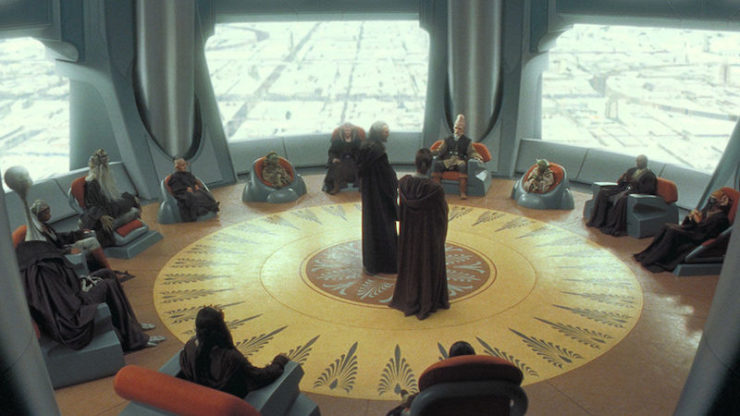
So let’s actually consider how the Force seems to operate in the Star Wars universe. We have a special form of energy that only certain sensitive creatures are capable of using. It allows the manipulation of objects, minds and, in certain cases, matter (i.e. you can create life at a certain level of mastery). Understandably, different groups emerged with different perspectives on how to use this energy and what its purpose was. The two most prominent sects in Force philosophy were the Jedi and the Sith. The Jedi were motivated by compassion, order, and a pursuit of peace. They believed that the Force had a dark side and a light side, and that pursuing the light side was keeping the Force in its natural state.
The Sith were practitioners who embraced the dark side of the Force, the side most commonly associated with anger, fear, and hate. It is important to note that the Jedi are the most insistent that the dark side works primarily on these emotions. However, the more interesting differences between the Jedi and the Sith lie in how they choose to operate the Force: the Jedi prefer to keep in contact with the Force occupying all living things, to draw on the natural world and use it to their advantage. The Sith are more concerned with cultivating internal energies, focusing on personal power and passions. Rather than anger and hate, it would be more correct to say that the dark side is predicated on selfish pursuits, or more interestingly on emotions at large. Sith seek to gain status and control their surroundings, while the Jedi seek to use their powers for the benefit of others and attain peace in place of emotion.
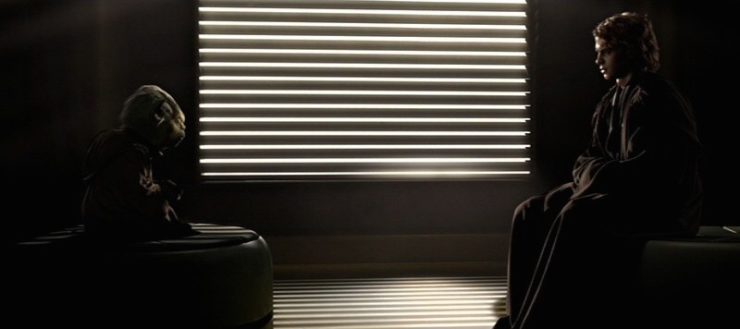
That sounds like the nobler endeavor, but the problem with the Jedi boils down to one word: order. Once you establish something as an order, rules and regulations are needed to give it structure. It would have been beneficial if the Jedi were simply “Random Acts of Kindness Agents,” helping those in need and offering a friendly hand, but once they had existed as an organization for long enough, they were simply folded into a galactic chain of command. They were called on at the behest of the largest government in the galaxy, involved heavily in politics, and they needed numbers to grow so they could properly handle the demand for their services.
Which is where the whole “taking babies from their parents to train them in the Jedi Way” thing started. No matter how you slice it, that’s one practice that never made the Jedi look good. While it’s understandable that you would want to start those kids early and get their brains ready for the harsh realities of the peace-keeping life, nabbing your recruits before they have they have the chance to form the most basic opinions is basically non-consensual brainwashing. Even if you and your compatriots are on the so-called side of goodness.
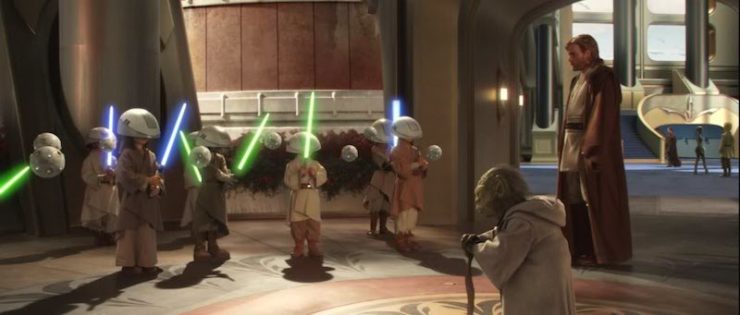
There are fascinating co-philosophies at work within the Star Wars galaxy. When the movie prequels came out, accompanying material stated that Qui-Gon Jinn and other Jedi like him were proponents of the “Living Force,” choosing to focus on the moment and let all living energies inform their decisions. The Clone Wars series introduced the concept of the “Cosmic Force,” the aspect of the Force that binds the universe together (that’s more Yoda’s bag, as you’ll recall from his sermonizing in Empire Strikes Back) and seems to have dormant and active states—Rey’s “awakening” to her sensitivities in Episode VII was the result of the Cosmic Force going through some brand new turbulence.
The Legends canon had even more ideas about how the Force should be perceived by living beings: there were believers in the “Unifying Force,” who did not adhere to the notion that the Force had sides—imagining instead that the Force was a deity-like entity that did not judge actions or living beings to be good or evil, and focused on the future to connect with that what was meant to be. Interestingly, this practice was also deemed important by many Jedi, though they did not seem to hold with any other beliefs associated with the Unifying Force philosophy.
How are we supposed to parse out this web of moralizing? It’s fair, perhaps, to claim that the Jedi are “more right” than the Sith in their views of the universe, but that does not make up for their myriad of errors in execution. Anakin Skywalker was believed to be the Chosen One as decreed by a prophecy. Because the Jedi believe that the elimination of the dark side equates to balance, the hope was undoubtedly that Anakin would bring the Sith out in the open and allow for their elimination. He failed to do that entirely, instead destroying the Jedi Order down to the last youngling. (Ouch.)
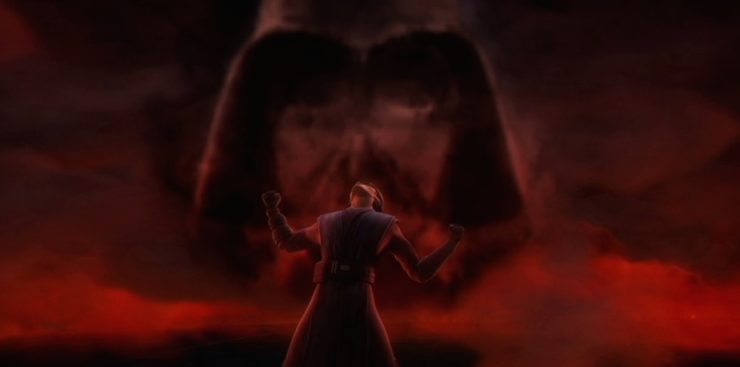
Unless you take the actions of Luke and Leia into account. In which case, Anakin Skywalker did manage to bring balance to the Force—by virtue of his children. His children who were not supposed to be born according to Jedi doctrine, because Jedi were not supposed to fall in love, get married, and have babies. Hello there, shaky ground. (For the record, this particular interpretation of events was confirmed by George Lucas himself.)
That ground gets even shakier when we examine what leads up to Luke’s near-death and Vader’s change of heart. Luke goes against practically everything that he is told by Obi-Wan and Yoda; he leaves Dagobah with his training incomplete, he confronts Vader before he’s ready, he cares too much about his friends. Yoda and Obi-Wan are still operating on the old system, acting secretively and deciding what is right for their pupil to know. Luke ultimately proves them wrong, in more ways than one: his defining moment comes out of a fall, an unintentional surrender to anger and pain, which then allows him to see where those emotions would lead him. Without that final duel between himself and Vader, Luke would have no basis for understanding what the dark side would demand of him. Vader would not then, in turn, have been faced with the prospect of losing his son, the tipping point that allowed him to destroy the Emperor. (I won’t say that Vader was brought back to the light side or the Jedi Way because I would argue that he wasn’t; Vader acted out of deep personal love and selfishness to keep his child alive, at opposition with the Jedi Code and the “correct path” for light side users according to the doctrine set down by the original Jedi Order.)
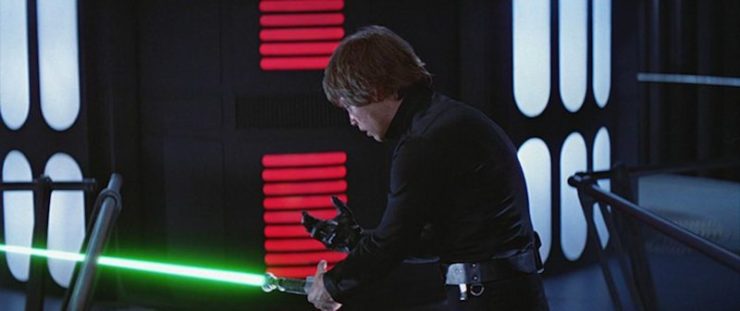
Which makes one curious: if the Jedi Order was training the initiated from infancy, breeding out any opposition or understanding of darker emotions, how did it manage to survive as long as it did?
More importantly, is it possible that “balancing the Force” actually includes the annihilation of the Jedi Order?
A look at what the Legends canon did previously to answer that question yields some surprising answers: Luke eliminated more than one of their ideological tenets when he reestablished the Order in those books. His Jedi trainees got married, considered new ways of using the Force, argued their purpose, and had complex personal relationships with their teachers and everyone they knew. Luke prevented his students from being asked to serve at the behest of the New Republic. He advocated different paths for different Force users and acknowledged that the Force may not have sides at all—it’s people who do.
Conversely, a look at the current expanded canon gives us another interesting viewpoint, particularly in the characters and events examined by The Clone Wars and Rebels. The Clone Wars series makes it abundantly clear that the Jedi Order is sliding into chaos and degeneration due to its position in the galaxy; the Jedi have their own diplomatic relations to uphold, often with denizens of the galaxy who are up to very little good. Alliances with various factions in the Senate and even crime lords like the Hutts can be observed as the Jedi struggle to keep some semblance of peace going in the galaxy. We learn that employees of the Jedi (such as cleaning and maintenance staff) are not fairly compensated or particularly well-treated. Some Jedi seem to keenly appreciate the carnage of the Clone War and fail to treat the clone troopers as sentient beings. In short, the Jedi Order is so wrapped up in its own politicking, it has failed to realize that it is just as susceptible to the misconduct that can plague long-standing institutions.
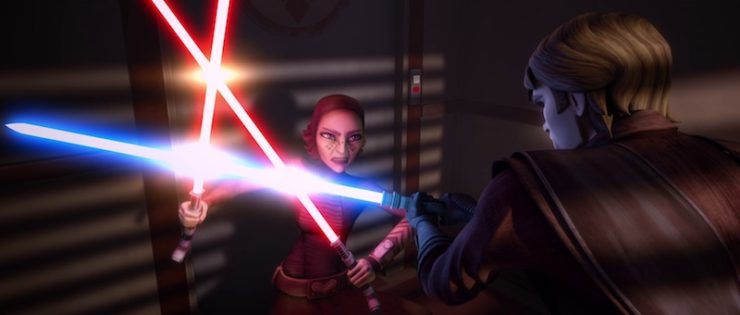
Barriss Offee, a Jedi Padawan of Master Luminara, becomes so convinced that the Order has been corrupted as a result of the war that she orchestrates a bombing on the Jedi Temple and frames her friend Ahsoka Tano for it as a way of bringing these issues to public attention. The fallout does not break down the way she intended—she is eventually arrested for the crime, and Ahsoka is so deeply shaken by the Jedi abandoning her to a Republic tribunal that she leaves the Order. The Jedi Order changes very little as a result, though so close to the end of the Clone War and Palpatine’s rise, one could argue that Offee’s point was made too late to make any difference. Funny enough, Ahsoka’s sharp decision turns out to be a boon to the budding Rebel Alliance, as she frequently turns up to aid their cause in the ensuing years. One could argue that Ahsoka Tano is a far more effective agent of peace and justice without the title of Jedi Knight, and she’s certainly a better friend and comrade.
In Rebels, Kanan Jarrus and his apprentice Ezra Bridger encounter a creature who identifies itself as Bendu on the planet Atollan. Bendu is not a Jedi or a Sith, but informs Kanan that he resides somewhere between those sides. He helps Kanan and Ezra repair their relationship at a critical juncture, and gives them information regarding the outcome of merging a Jedi and Sith holocron together. Bendu seems largely sage and benevolent, but all of this deteriorates when Kanan calls him a coward for refusing to fight with the rebels who have set up base on Atollan against incoming Imperial forces. Bendu insists that they should not have disturbed his peaceful planet and essentially transforms himself into a storm. Suggesting that the will of the Force was perhaps to eliminate the Jedi and “all your kind,” Bendu reigns down destruction on Atollan, and the rebels barely escape. It is important to note that Bendu only become violent when provoked and coerced into a war he wanted no part in. This might be our first glimpse into what a non-aligned Force-user could bring the galaxy; wisdom and perspective, but with the potential for great power. And what would that mean for the future of the Star Wars universe?
Now we have a trailer for Episode VIII, and Luke has a few choice words for us: “It’s time for the Jedi… to end.”
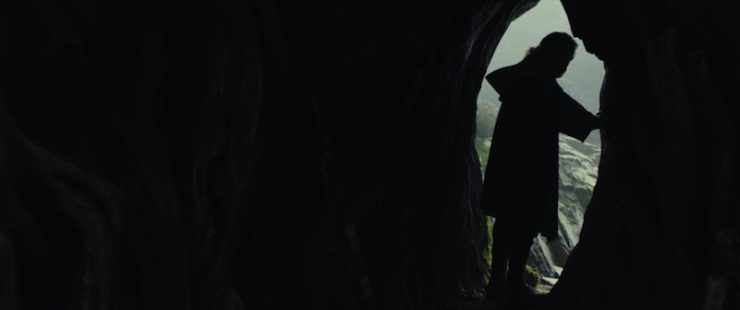
We know that prior to the events of the third trilogy, Luke was training some new Jedi, and that those students were ostensibly slaughtered—either by his nephew, Ben, or by other members of the Knights of Ren who absorbed now-Kylo into their ranks. We also know that Luke has spent all this time hidden away on a planet that supposedly houses the first Jedi temple. Knowing all of this, all that Luke has been through and likely learned… isn’t it possible that he finds the old ways too limiting to sustain? That he has learned enough about the Force to recognize that these labels have bound people up for so long that the battle between “light” and “dark” has become a never-ending cycle?
Because I’ve got news for you—the history of the Star Wars galaxy is precisely that. Jedi versus Sith, for thousands upon thousands of years, locked into a war they created for themselves and never seem capable of eradicating. The Sith are gone in name, but the Knights of Ren remain. Someone has to stop them… but maybe that someone shouldn’t be a Jedi.
Maybe the galaxy has to change.
Perhaps what Luke has discovered is that this overbearing focus on “light” and “dark” sides has only led to utter polarization and stagnation. While using the Force out of compassion is clearly a good idea, just as using it out of anger is a bad one, it may be time to let go of the old teachings and create something new—making the future of the Star Wars saga anyone’s guess.
Emmet Asher-Perrin just wants someone to give Luke a damn hug when this is all over. You can bug her on Twitter and Tumblr, and read more of her work here and elsewhere.











“How are we supposed to parse out this web of moralizing?”
Well putting aside the destruction of an entire planet, not only killing all people but all life. Look at that picture with the youglings practicing with their Light Sabers. Now picture, we have to imagine because Lucas didn’t have the guts to to show it on screen, Anakin slicing and dicing every one of them.
I don’t need labels, or philosophy, or explanations to know it does not get any more immoral and evil than that. Yea the Jedi Order may have gone off track, become a bureaucratic kluge but they certainly would not destroy entire planets or kill children to empower their Order.
Perhaps, but it doesn’t make them look bad. It isn’t like they were shown seizing children from their parents, but instead, taking children, and educating them, with no indication that any of it was particularly unwilling or forced.
Besides, to characterize what the Jedi are doing as brainwashing, overlooks that they aren’t doing anything parents don’t do across the Galaxy anyway. Have children. Raise them. Educate them. And yes, there are problems with education that induces a deeply troublesome mindset, but what does that mean? Can’t just leave babies on their own accord.
Lucasfilm said the philosophy of the Jedi Order was correct, not its politics or how they acted upon that philosophy. And Clone Wars/Rebels are canon. Lastly, the Jedi are not just saying the dark side feeds on negative emotions, Sith on screen have said it themselves.
Excellent article as usual! You’re completely on point about the problems of the order and how they ruin everything when they turn into politics and governmental peace-keeping unit. I agree that the only explanation for baby snatching is the need to have a crescent number of troops. Can’t there be any Force-sensitive kid in their native planet in peace? Is it really a risk if they aren’t trained? I haven’t read the novel but I watched a video about the unproduced scripts of Clone Wars TV show and, as you mentioned, after the most unfair and superfail trial of the galaxy, Ahsoka turned into Coruscant’s underworld vigilante that helped the ones who needed after leaving the order: “Random Acts of Kindness Agents” indeed
About Bendu in Rebels Season 3, I was so angry at Kanan for calling Bendu a coward. He was the one who selfishly wanted Bendu to help them and take a side! Initially, I thought he was going to warn him about the attack because he was worried about Bendu’s safety, not because he wanted to recruit him as a sort of weapon. And Kanan called himself his “friend”. Bendu didn’t have to take a side, even more, why there must be sides?
3, and yet Palpatine said quite clearly to Anakin that the anger he felt was a source of strength and focus. Which are usually considered valuable characteristics to some extent.
Oh, BTW, there’s also a lot of discussion of the Force in a Christian Context, for those interested in another view. I forgot to mention that perspective earlier.
@5
How much of Palpatines line was just empty flattery, which we know any late teenager desperate for approval is very vulnerable to?
I’m not fond of a philosophy on the force being labeled as “correct”. “There is no emotion, there is only peace” has just as many serious problems as “Peace is a lie, there is only passion” does. Emotion is a part of sentience, with the purpose of attaining peace. Both are necessary to life, and denying one is an invitation for mental instability.
6, it is a consistent philosophical sentiment among the Sith, I believe, at least insofar as Star Wars can be consistent.
Very thoughtful and well researched post. For me, starting with the original film “Star Wars”, it always seemed that ideas of the Force were simply there to drive the story, for the most part. I’m not belittling that, just saying that it was not a fully thought out philosophy in the first film. But that is why Star Wars has been such a cultural phenomenon, it was the touchstone that started all of these types of discussions about how to live and, most importantly, how to integrate into our way of life the newly forming technology and computer industries that were coming about in the 1970’s. Dualism will always lead to conflict. Integrating two sides in a way where there is no longer a conflict but peace is what I interpret as the “Balance” referred to in the films.
This post could benefit, particularly in speculation for future from discussion of The Legends of Luke Skywalker by Ken Liu. This book explicitly explores other force users who view the force not as a binary system but as a sliding scale with end members. Basically, there is no dark or light side, only the force. The corruption comes from those using the force. There are some interesting ideas about what’s to come that can be derived from that inclusion in the book leading up to The Last Jedi.
I want to know what the justification for leaving Anakin’s mom in slavery for at least ten years. I understand Padme was inconvenienced at the time, but as soon as she was back at Naboo and in charge she certainly could have made Watto an offer he couldn’t refuse. The options are:
1. Padme forgot. Not really likely.
2. Shmi refused to leave. Possible depending on when she met Lars.
3. The Jedi stopped it. Which means what, the Jedi show compassion unless they want your kid? Is that the deal, Jedi can take kids as long as they don’t affect the social order? That making more Jedi is more important than acting like one? Heavy.
@10/BrianDolan: Are the Jedi even supposed to have contemporary moral values? They were okay with having a clone army built for them, weren’t they? But clones are people too.
As for Jedi taking kids from their families, child monks are taken straight out of Buddhism.
@10 Why didn’t Anakin do anything to help her over those ten years? There is the reality of the Universe to deal with, if you are going to ‘free’ one slave shouldn’t you free them all?
Every one keeps using the same phrase, “the Jedi take children from their parents” while technically correct it sounds like they are abducting the kids. They don’t kidnap kids they get the permission of the parents first.
Everyone also talks about the strict Jedi Order rules yet no one seems to follow them to the letter, both Obi-Wan and Qui-Gon both defied the Jedi Console not to train Anakin and yet they did not get punished or dismissed from the order, so just how stringent are these rules and are they more of a guideline than hard and fast rules?
@@@@@ 10 – you perhaps assume communication is easy. Padme is stuck on Naboo, Anakin on Coruscant or training somewhere with Obi-Wan… if it takes moving out of an asteroid field in order to get a clear signal from The Emperor to Vader and we rarely see much in the way of reliable communication from anyone other than the major power players (Emperor, Queen/Senate or Jedi/Council members), it makes sense that transferring credits and freeing a slave would be impossible without being there in person. I’m not saying that they couldn’t send emissaries, but the fact remains that it apparently would’ve been more difficult than an email and a fund transfer.
With the newer material the Force cannon seems to be drifting into the same territory as the Others in the Night/Day/etc Watch series by Lukyanenko (books, not films). Night and Day Watch are basically the Jedi and Sith, with the Night Watch watching out for humanity and the Day Watch much more interested in their own pursuits. The expansions to the actual morality and organizations that are revealed later are similar to where speculation has the Force going in the Last Jedi, but I’ll say no more to not spoil the great series.
10, I could easily come up with an explanation that Watto was harmed by his gambling against Anakin, which lead to Shmi being sold off to another, unknown person, and finding her on a place like Tatooine could be quite difficult.
It would be something worth a bit of exposition, but I can understand it being cut too.
@13
There’s also Tatooine’s political situation to add a further problem. Tatooine was only kind of part of the Republic. That kind of money and people moving in and out of the Republic would be even harder.
Great article. My favorite bits of star wars are when the force and it’s implications are explored in interesting ways. For me, one of the best bits of star wars storytelling is in KOTOR 2, when Kreia wants to destroy the force, even at the cost of life. It’s been a while, but my interpretation of her reasoning is that as the force seems to predetermine actions, everybody is enslaved. Therefore, the only way to free people from a cycle of violence and pain, especially if the force does somehow constantly need to rebalance, often with the consequence of awful violence, is by destroying the force.
My one regret from that game is that you don’t have the choice at the end to just to go – well actually, this is shit, and through the force, indeed as an agent of the force, I have been ‘forced’ into another load of awful violence, with all my friends dying, again just like Malachor V. You know what Kreia, you’re right, let’s just destroy the force and be done with it!
That would have been the ending I would have chosen, because if you think about it, it kind of makes sense!
In fact, I’m just going to have a rant now. Do you know what? I’m going to say it. I really didn’t like the force awakens that much. Through the force, star wars has a really interesting vehicle to explore some big questions. What does predetermination mean for living our lives? What are ‘good’ and ‘evil’ really, and how far should we go being a bit evil in order to stop more evil? Does that even work out for the best? Did the force awakens even attempt any of those things? Although it had some good elements, I still feel the it was just far too Marvel-afied.
Shouldn’t good storytelling be challenging, and get us to question our preconceptions about life etc? To be honest, maybe I just want star wars to be something it’s not! Am I the only person who feels like this?
No, you’re not the only person with such feelings about Star Wars. There’s a lot of people who have taken a deep meaning from the movies, enough to influence their lives, and this began even before Empire Strikes Back was released, and they even published books so it’s documented. And when it comes to the recent movie, well, again, I’ve also seen your sentiments expressed about it.
I’m waiting and seeing, I may attribute the situation to a matter of pacing, in that they’re going to get to the meat of the story, but it’s a slowly delivered process.
@18/Joi: I think you’re asking too much of Star Wars. It was never intended to be anything but pop entertainment. It has forces of good and evil because those have been a part of pop culture since Tolkien, or perhaps since King Arthur. It has Buddhist and New Age elements because it was the 70s. The one thing George Lucas was really good at is taking lots of stuff from different sources and blending them into a seamless whole. That doesn’t mean that he had a message.
20, you tempted me into making a remark about how George Lucas blended his elements into an indistinguishable mush that has lead people into thinking his message is whatever they wanted to hear.
I’ve always preferred to think of the light and dark sides as separate from the Jedi and the Sith. The former are not necessarily fixed to the latter, and the Force itself may or may not actually have light and dark sides, depending on an underlying question.
SWtOR does one thing really well, in that it allows you to play a light or dark Jedi or a light or dark Sith, even as you play out the actual philosophies of the respective orders. One can act according to the basic rules of the Sith and be more in touch with the light side, just as one can adhere to the rules of the Jedi and become deeply invested in the dark side.
The Jedi are about corporate action, about devaluing the individual and promoting the greater good. Executed properly that means denying the self and acting on behalf of the good of others, but executed badly that means treating individuals as worth less than groups, sacrificing the individual for a perceived good of society, the state, or even the Jedi Order itself.
The Sith are about individual action, about recognizing one’s emotions and using them as a source of motivation. Done badly (the way most Sith do it) this leads to utter selfishness and self-indulgent wallowing in the negative emotions that so often overwhelm a person (pride, anger, fear, hatred, of the self and of others). Done well, however, and you find a person who acts out of love, compassion, charity, mercy, and the understanding that advancing one’s self can raise up others with you.
The whole Jedi-Sith thing is far more about philosophical differences than about the Force itself. From what I understand, the lore was (I don’t know if it still is anymore) that the Jedi were a self-segregated community of various force users. Eventually a small group got together who had developed a new approach to interacting with the Force, but the wider group disagreed – violently. They tried to purge these force heretics and started something of a civil war, which the majority side (the Jedi) won. The exiles fled known space and arrived on Korriban, where they encountered the Sith people. Having been winnowed down to the most militant and embittered members of their splinter sect, they used their powers to seize control and set themselves up as the rulers of the Sith (hence the name of their new philosophy). The violence and strife that plagues the Sith can thus be traced to the way that the Jedi treated the first adherents to a more personal understanding of the Force.
There is also a question about the nature of the Force itself. Is it monolithic? Is it dualistic? If the Force is one, then the very idea of a light and dark side becomes less about real division and more about interpretation or use. If it is dualistic, then the light side and the dark side are actually separate things, making the divide between them not just philosophical but real. Until this is settled, it is really impossible to say if the dark side is simply a matter of misusing the Force or an actual malevolent intelligence. If the Force is one, then that would at least suggest that the Jedi are flawed in their basic understanding of the nature of the universe and would be a powerful argument in favor of the Bendu, the Gray Jedi, and other independent, unified Force religions.
The Sith are about domination death and destruction. Name one positive thing a Sith has ever done. The fact that the Jedi are problematic doesn’t mean the Sith are good guys.
@23: “SWtOR does one thing really well, in that it allows you to play a light or dark Jedi or a light or dark Sith, even as you play out the actual philosophies of the respective orders. One can act according to the basic rules of the Sith and be more in touch with the light side, just as one can adhere to the rules of the Jedi and become deeply invested in the dark side.”
Everything that follows about potential good Sith and potential bad Jedi is in light of the above.
The question about the actual nature of the Force is of course a separate issue.
23, what material are we allowed to use? Just the MMO has several.
The Clone Wars didn’t introduce the Cosmic Force, it’s in the Making of TPM book, Lucas had already invented the concept.
@22 – that’s some thinking material you delivered. Another thought that should come into account is the will of the force. Is the dynamic between it’s will and the choices being made that made the force to come to the need of someone balancing the force… I mean if everything (especially inside the force/force useres) is from the start being narrated by the force (like some puppet master) then there is no need of a balance, since everything is under control from the get go. So now that we have a prophecy of a balance and therefor an unbalance of the force, the conclusion is that their lives weren’t narrated by the force wihout crucial choices of their free will.
But if that’s the case, then the whole universe is a lively relationship, an open discussion between the force and the rest, where the Jedi are the gifted ones who have miracle like direct contact with the force, which gives them the understanding of the need to meditate in order to try to understand what the force wants with their choices, as it has such a strong and global impact on all the universe.. So since that is the case, after 8 movies and too many eu material, there must come someone bold enough, who comes up with the canon exploration and explanation of that, because until now it looks like everyone was to afraid to get to this point directly. what IS the will of the force? the unending slaughtering between force choke and saber duels? If there were no indications of a will, then you might say that’s yin and yang and that’s that, but there Is a will, so what is it? As that is the core of the relationship between force users and the force, it would be only “fair” if it all would be finally adressed.
I think the main problem really is that the general audience, and a lot of fans, just don’t understand the way the Force works.
There isn’t a ‘Light Side’.
There’s the normal, proper way of the Force. Life. The Jedi understand it.
The people who use it for themselves, selfishly, corrupt it and themselves. That’s the Dark Side.
And when people are corrupting it, taking and not giving back, they make it out of balance.
The balance of the Force isn’t equal good and evil. It’s when the flow of life works as it’s supposed to, with no-one corrupting it and using it for selfish ends.
Yes!
29, that’s less consistent with the approach of the various materials than you may realize.
@@@@@29 sounds good enough, but 31@@@@@ is in my opinion right.
29@@@@@ – If the Sith were unbalancing the flow, unlike the Jedi, then how do you explain Anakin as being the prophecised balancer (?) of the force? He didn’t finish the several Darths out there, he just wiped out all the “flowing” Jedi in a cruel witch hunt. So what kind of balance is that? if the meaning was to even the bad and the good, there being the same amount of Jedi and dark users (again sounds more like a “neutral” force in a Yin and Yang kind of way), then how come the “need” of the force for balance waited for a millenia (quote from Darth Maul EP I) to do that?
@@@@@29 + @@@@@30 I also would love this flowing, good natured force. princessroxana I also prefer looking at SW as fantasy reather than SF (as you recently posted in “the 5 sopiest romances”), meaning the Jedi represent all that is good, they are the shining white knights rescuing the princess in distress and than the whole galaxy from the evil clutches of the selfish fallen Jedi, but it is not consistent not only with eu, but even with the prequels. That’s another reason the prequels sucked. Not only because they were simply bad written/directed movies, but moreover what the inner content, the core of SW concerns, Lucas changed the simple Tolkien like ideal of good vs bad, to something more complex more grey. like it or not it changed SW as the OT was that good simple fantasy. I don’t like it, but I have to accept that that’s Lucas vision of SW.
So my conclussion in the meanwhile, is that the force wanted to “educate” the Jedi order, as they lost the way and got so cought up in their complicated webs, that even though they tried to meditate and search for enlightment by the force, the search was not honest enough, as they would not dare thinking of parting with their sometimes faulty ways. So as the force does not simply discuss what it wants for the best of the universe, it had to show them by educating them. So that they would loose the “grey” affects of being linked the the corrupt republic and come back to simple flow with the universal good, being an example for the rest, and trying to help the universe without politics. That’s what I would like to come out of that. But Emily-Asher Perrin has a point, that it looks like the new minds behind SW wants to give us the “grey” Jedi as the will of the force, as the universal truth. which I kind of detest. It’s just grey. no white no light. grey….
before the purge over 1000 jedi only 2 sith. PALPATINE kill all but 2 jedi seems balanced to me
@32 In my opinion you nailed it. that’s my opinion as well, so Lucas vision is not Tolkien like, it still leaves us with the question what was the balance all about (or in other words what is the will of the force?) if “grey” is the proper “natural color” if you will, of the force, then @33 is propably right, but what does the universe gain balancing the equation like that? were too many Jedi, who tried to bring peace and harmony, such a bad influence that they had to be wiped out in order to get the right balance? if so, that’s a rather sick balance in my opinion… or it still fits with @32, meaning the balance was not for the immediate impact on the galaxy. but rather the balance of some priciples in the Jedi order, meaning they are caught up in “grey zones” and needed to be educated and start from scratch… but if so Luke miserably failed… so still no balance in the force. but that can’t be right either, because than Anakin is not the prophecised one, unless 2 vs 2 was the main idea, and then in a circle we go back to what I started to say here about that possibilty being faulty… LOL